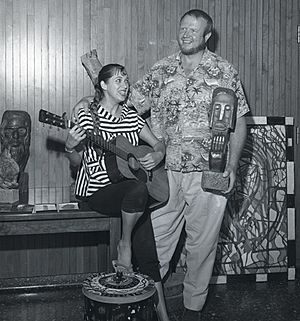Eric "Big Daddy" Nord facts for kids
Eric "Big Daddy" Nord (1919–1989) was a very tall and well-known person during the Beat Generation. This was a time in the 1950s when many artists, writers, and musicians expressed themselves in new ways. Eric Nord owned coffeehouses and nightclubs. He was also a poet and an actor. A newspaper writer named Herb Caen even called him the "King of the Beatniks." He helped start the famous hungry i nightclub.
Contents
Eric Nord's Early Life and Work
Eric Nord was born in Germany in 1919. His birth name was Harry Helmuth Pastor. His mother was American, and his father was German. As a child, he often traveled to the United States with his father for business.
When he was 19, he moved from Germany in 1938. He went to Los Angeles to study acting. This is when he chose his stage name, Eric Nord. Later, he moved to San Francisco.
Starting the Hungry i Club
In the early 1950s, Eric Nord sometimes worked at a place called the Co-Existence Bagel Shop. This was a popular spot for young people in an area called North Beach. People who visited there were sometimes called "shadow people" or "turtle neck angel guys."
Around 1950, Nord rented a basement in North Beach. Many young people, who were interested in the Beatnik style, started to gather there. He named this place the "hungry i" nightclub. Later, another person named Enrico Banducci took over the club. It became a very important place for new stand-up comedians to perform.
Moving to Los Angeles
After some time in San Francisco, Eric Nord moved to Venice, California, in 1959. There, he opened a new place called The Gas House. This was another popular spot for beatniks and poets. They would read their poems and share their work there.
The Gas House was even used as a setting for a movie! It was a horror film called The Hypnotic Eye (1960). Eric Nord appeared in the movie as a beatnik who played the bongo drums. This role helped him start a short career in films. The Gas House was open for three years. It was a place where writers and musicians could live and perform.
Later Adventures
In the 1960s, Eric Nord moved to Hawaii for a short time. He also tried to get involved with a health spa. Later, he became part of a group that wanted to start a special community in Guatemala. However, a revolution in the country stopped that plan.
In 1965, Nord opened a coffee house called the Sticky Wicket in Aptos. He also opened a place called The Barn in Scotts Valley. The Barn was an art gallery and coffee house. It had a large area for concerts. Famous musicians like Janis Joplin and the Grateful Dead performed there.
In the early 1970s, he ran a "cultural center" in San Francisco's Haight Ashbury neighborhood. In 1972, he acted in an underground photo-comic called SuperJesus. He played the character 'God' in it. He moved to Los Gatos in 1975. Eric Nord passed away in San Jose in 1989.
Eric Nord's Creative Works
Eric Nord was known for his poetry and acting.
Poetry
- As He Sees It (1968)
Movies
- The Flower Thief (1959)
- The Hypnotic Eye (1960)
- Once Upon a Knight (1961)
- Hungry Eye (1971)
- Behind the green door (1972)
- Steel Arena (1973)


